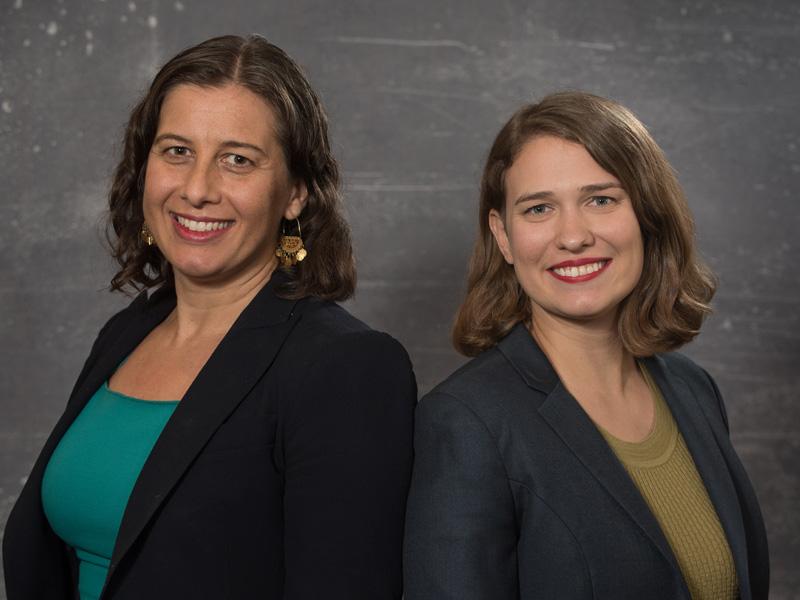Professors Hlass, Yanik land grant to study race and immigration detention
Tulane Law School – in partnership with a scholar at Boston University and an interdisciplinary team – has been awarded a grant to study the role that race plays in mass and prolonged detention of immigrants across the country.
Immigrant Rights Clinic Director Professor Mary Yanik and Co-director Professor Laila Hlass received the award from the Ibram X. Kendi’s Center for Antiracist Research after they developed a proposal with Boston University Professor Sarah Sherman-Stokes to request and analyze government data on the length, scale, and demographics of immigration detention.
“ICE’s immense detention system operates in a black box, lacking transparency and appropriate accountability mechanisms. Our research project seeks to force ICE to release critical data to shed light on the scope and scale of mass and prolonged immigrant detention, including the racialized impacts of this vast but hidden carceral system,” said Hlass.
While the United States detains large numbers of immigrants annually — more than 250,000 immigrants were detained in over 200 jails and prisons across the country in 2021— Immigration and Customs Enforcement (ICE) releases very little data about detention trends. The sprawling immigration detention network is the largest carceral system in the country, far exceeding the numbers of those held in federal prisons for committing crimes and larger than any state’s prison system.
Their project will examine the harms to immigrants who face long detentions and outcomes, broken down by demographics including race. Additionally, Hlass and Yanik will collaborate with an interdisciplinary team of community advocates, including the nationally renowned Black Alliance for Just Immigration, journalists, data scientists from the Migration Policy Institute, and communications specialists to share findings from their analysis that contribute to the national conversation about immigration detention.
Once the team has its findings, the goal is for advocacy partner Black Alliance for Just Immigration to examine the impact of race in detention and deploy advocacy efforts to forward racial justice.
“We’re thrilled to bring together this talented interdisciplinary team, so we can conduct robust analysis of detention data and then collaborate so our research findings reach the public and assist BAJI in their tireless advocacy for Black immigrants in detention, “ said Professor Yanik. “We are honored to be supported by the Center for Antiracist Research.”
The research project builds on Hlass and Yanik’s collaboration in “No End in Sight: Prolonged and Punitive Immigration Detention in Louisiana” where they worked with clinic students and research assistants to analyze 499 federal cases that challenged prolonged and unlawful detention, filed in Louisiana over a decade. According to their research, by the time that detained immigrants filed these habeas petitions in court, they had already faced more than a year in detention, and many faced many more months while their cases wound through the federal court system.
Detainees faced trouble accessing legal help in the system, with 75 percent unrepresented throughout their cases. Significantly, Black immigrants were disproportionately represented among those challenging their prolonged detention: Black immigrants represented more than half of those filing petitions in Louisiana. Across the nation, more than 20 percent of those detained for long periods are Black.
Furthermore, every long-term Louisiana immigration detention center is located in a rural area—far from most immigration attorneys—and so all of these cases are heard exclusively in the Western District of Louisiana, where immigration attorneys are litigating the legality of prolonged detention more frequently in recent years.
Hlass and Yanik have collaborated for years. As Director of the Immigrant Rights Clinic, Yanik supervises students in representing immigrants in deportation defense, affirmative applications for lawful status, constitutional litigation, and strategic advocacy. She specializes in assisting immigrant workers, including victims of labor trafficking, and in defending the constitutional rights of immigrants.
Yanik previously worked at the New Orleans Workers’ Center for Racial Justice, leading a law & organizing practice in support of community-directed campaigns for labor, migrant, and racial justice. She served as local and trial counsel in federal litigation challenging the constitutionality of Louisiana’s marriage license law and, separately, prolonged immigration detention in Louisiana. She has represented dozens of immigrant workers in reporting labor abuse to the Department of Labor, Occupational Safety and Health Administration, and National Labor Relations Board, and also specializes in seeking immigration protections for immigrant workers vulnerable to employer retaliation.
Hlass founded and co-directs the Tulane Immigrant Rights Clinic with Yanik. Her teaching and scholarship focus on law, policy and practices that affect access to justice within the immigration law regime for particularly vulnerable communities including children, detainees, asylum-seekers, and survivors of violence. She previously served as Director of Boston University’s Immigrant Rights Clinic.
Hlass and Yanik in 2021 joined leading academics from Harvard Law and Miami School of Law, among others, when they were named 2021-2022 Bellow Scholars for their pioneering research examining ten years of habeas litigation challenging prolonged immigrant detention in Louisiana.

